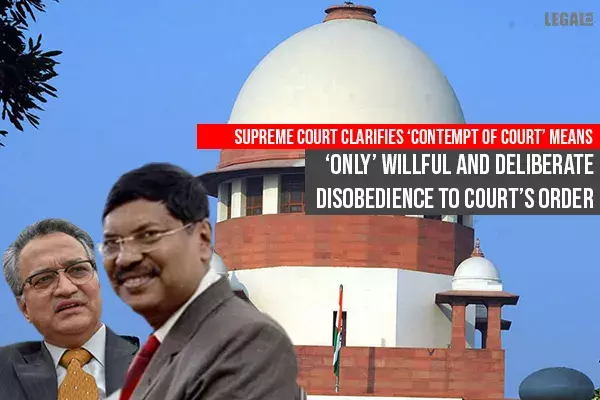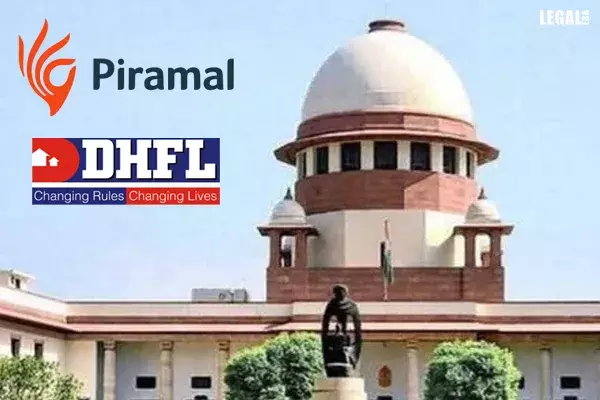Supreme Court clarifies 'Contempt of Court' Means 'Only' Willful and Deliberate Disobedience to Court's Order
On 19 January 2021, the Supreme Court of India (SC) has observed that before punishing a person for contempt of Court;

Supreme Court clarifies 'Contempt of Court' Means 'Only' Willful and Deliberate Disobedience to Court's Order On 19 January 2021, the Supreme Court of India (SC) has observed that before punishing a person for contempt of Court, the Court must ensure that the person has not obeyed any judgment, decree, direction, writ, or other processes and such disobedience was willful and...
Supreme Court clarifies 'Contempt of Court' Means 'Only' Willful and Deliberate Disobedience to Court's Order
On 19 January 2021, the Supreme Court of India (SC) has observed that before punishing a person for contempt of Court, the Court must ensure that the person has not obeyed any judgment, decree, direction, writ, or other processes and such disobedience was willful and intentional.
The bench comprising Justices AM Khanwilkar and BR Gavai clarified the meaning of 'Contempt of Court' while closing a contempt petition filed in 2008. The family dispute arose between a father and his two sons from his first wife.
A contempt petition was filed by Rama Narang (Petitioner) against Ramesh Narang & Ors. (Respondents) before the Supreme Court. It was alleged in the contempt petition that the party in his attempt to overreach an order passed by the Top Court in an earlier contempt petition, approached the Company Law Board (CLB) and obtained an interim order.
It was further contended on behalf of the petitioner that invoking the jurisdiction of the CLB and entertaining the said proceedings by the CLB, itself amounts to contempt by the respondents.
The bench clarified that a person cannot be held guilty of 'Contempt of Court' merely because he took recourse to other judicial proceedings that are open to him during the pendency of certain proceedings; even though the latter proceedings put the other party at a loss.
It bench stated "It can thus be seen, that this Court has held, that the contempt proceeding is not like an execution proceeding under the Code of Civil Procedure. It has been held, that though the parties in whose favour, an order has been passed, is entitled to the benefits of such order, but the Court while considering the issue as to whether the alleged contemnor should be punished for not having complied with and carried out the directions of the Court, has to take into consideration all facts and circumstances of a particular case. It has been held, that is why the framers of the Act while defining civil contempt, have said that it must be willful disobedience of any judgment, decree, direction, order, writ or other processes of the Court."
The Court further mentioned that the contempt proceedings are quasi-criminal in nature and the standard of proof required is in the same manner as in the other criminal cases.
The Apex Court referred to the judgment passed in the case of Kanwar Singh Saini v. High Court of Delhi, (2012) 4 SCC 307, wherein it was held that in an appropriate case where exceptional circumstances exist, the Court may also resort to the provisions applicable in case of civil contempt, in case of violation/breach of undertaking/judgment/order or decree. However, before passing any final order on such application, the Court must satisfy itself that there is a violation of such judgment, decree, direction, or order, and such disobedience is willful and intentional."
It further put reliance on the judgment passed in the case of Debabrata Bandhopadhyaya v. State of W.B. [AIR 1969 SC] the Apex Court dealt with seriousness of Contempt of Court. It stated, "Both the accuser as well as the Judge of the accusation. It behooves the Court to act with as great circumspection as possible making all allowances for errors of judgment and difficulties arising from inveterate practices in Courts and Tribunals. It is only when a clear case of contumacious conduct not explainable otherwise, arises that the contemnor must be punished."
The bench closed the contempt petition and stated that a case of willful, deliberate, and intentional disobedience of any of the directions given by the Court or acting in breach of an undertaking given to the Court is not made out in the present case.
The SC stated while dismissing the contempt petition, "The present contempt petition deserves no merit and is liable to be dismissed, we find that such an application need not be entertained."





